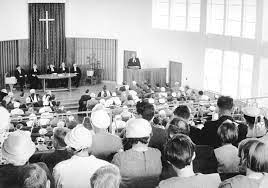by Phil Andrews

Our parents told us it was so, and how we laughed. How they longed for the days when they and all their many siblings shared one pair of shoes and went to school on alternate Tuesdays, walking home over seemingly endless miles of mountainous terrain to a block of lard and a beating. Their off-the-peg clothes held up with braces, or string. Their bland, anodyne music issuing forth from a scratchy old gramophone which needed to be recharged periodically with a turning handle. Their black and white television set occupying half the room, with twenty numbers on the dial but only three channels, and half the neighbourhood crammed into the living room to watch the news and the hopelessly inaccurate weather forecast once the little white dot in the centre of the screen had finally given way to some real live action.
And just how much fun could it have been living through a major world war?
And yet, apparently, they were the “good old days”. Somebody even named a TV show in honour of them.
My generation, on the other hand, never had it so good. Sure we had power cuts, the three-day week, rampant inflation, political instability, the Cold War and the Cod War, strikes and more strikes, the uncollected refuse and the unburied dead. But we knew how to party. Our stacked platform heels were not half as impractical as they gave the impression of being, our music was pure art even if some of those performing it turned out to be a bit dodgy, we didn’t need more than three flavours of ice cream, and although we didn’t have a lot of money we seldom wasted what we did have on haircuts and stuff.
They indeed were the glory days. If only my children wouldn’t tut or snigger when I try to tell them.
Character building
Speaking of the long, hot summer of 1976 the Irish radio presenter Henry Kelly once tartly remarked that it “was a good year, because we were so much younger then”.
We all tend to look back through rose-tinted spectacles to an age when everything was in apogee, when it never rained and where even hardships were not really hardships at all but rather exercises in character building, travails and tribulations designed to make us the better people we presume ourselves to be today. As someone who makes at least part of his living from nostalgia, I know what a powerful force it can be and the emotions that it can arouse.
We in the Church are sometimes no different. There can be few of us who don’t sometimes feel that we are fighting a rearguard action, like King Cnut helplessly trying to hold back a tide that would inevitably come to engulf him (actually he was a wise man attempting to demonstrate his limitations to his subjects, but I choose to use the hapless Cnut of popular mythology in order to illustrate my point).
A pivotal role

Of course, looking back with fondness is not an entirely irrational exercise where the Church is concerned. Most of us can remember an age when congregations at Sunday services were much bigger, when the role of the Church in the life of the wider community was so much more pivotal, when everyone who was anyone at school attended Boys’ (or Girls’) Brigade, when Christian assemblies in the school hall preceded lessons each and every morning. It is undeniable that, in our part of the world at least, active Christianity has become very much a minority enthusiasm, to the point where those of us who attend regular services and other Church activities are considered perhaps a little odd.
What are the reasons for the decline in Church attendance in our Western society during recent decades?
Well, as many Facebook users like to say of their relationships on their personal profiles, “it’s complicated”. There is likely to be more than one reason behind this unwelcome change. It certainly is more “complicated” than, as some old-school Christians sometimes like to suggest, an expression of collective abhorrence of the Church’s perceived abandonment of some of its more “traditional” ideas.
One, admittedly unscientific, means of putting this to the test would simply be to ask those who don’t attend Church or do not profess a faith why this is so. I would venture that very few responses received would be to suggest that we had “gone soft” on some of the more “traditional” attitudes which have been given vent to over the years. Many more, I suspect, would accuse us (wrongly, in my view) of lacking inclusivity, of being intolerant and “out of touch”.
The Word is timeless
Naturally, as Christians, our calling is to preach the Gospel, in whichever way we are best equipped so to do. Our beliefs do not bend to embrace the latest fads, neither should we ever crave popularity, or “relevance”, in place of truth. Like God Himself, the Word is timeless and transcends trends and fashions.
But I do wonder sometimes whether an obsession with “doctrine” at the expense of spirit sometimes leads us to a place where we erect barriers to the realisation of our mission which really do not need to be there.
In the Sermon on the Mount (Matthew, Chapters 5 to 7) Jesus paraphrased six Old Testament laws, explaining to those who had gathered to hear Him what they actually meant, rather than simply what they said.
Jesus did not come to invalidate the laws, He came to give meaning to them. To explain them. Chanting scripture is a somewhat pointless exercise unless we make some kind of effort to understand its meaning, which includes some attempt at comprehension as to why it is actually there.
The good old days
There are indeed many reasons why fewer people come to Church than they did in the “good old days”. We are a multi-faith society, meaning that many within the population choose to worship in other ways. We are a materialist society, in which the worship of Almighty God has been replaced by a reverence for Almighty Gold. Incredibly, the ideologies which drive this avarice seem much beloved of many of today’s Christians, which must be a source of some confusion to outsiders looking in.
We are a society which makes gods of celebrities, of sports people and of “influencers”, pillars of untamed wisdom all.
We know that at the very heart of our faith is love (1 Corinthians 13:13). And people have not rejected love. They simply question whether love and an adherence to the Christian faith are mutually dependent.
There are even those who consider the two to be irreconcilable, and that is a shame.
The old days had a lot to commend them, not least full pews and burgeoning offertories. But it may be a mistake to look back upon them and assume that they had answers which we have since somehow lost. Maybe we’ve yet to find them.